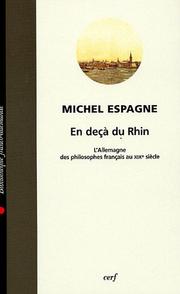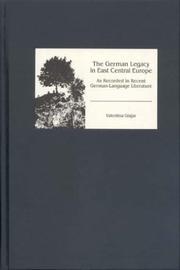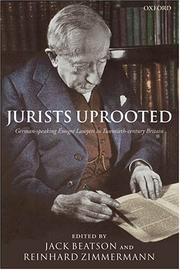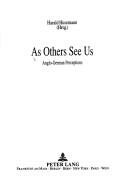| Listing 1 - 8 of 8 |
Sort by
|
Book
ISBN: 5020102407 Year: 2004 Publisher: Moskva Nauka
Abstract | Keywords | Export | Availability | Bookmark
 Loading...
Loading...Choose an application
- Reference Manager
- EndNote
- RefWorks (Direct export to RefWorks)
Germans --- History --- Moscow (Russia) --- Russia --- Civilization --- German influences.

ISSN: 11593865 ISBN: 2204075973 9782204075978 Year: 2004 Publisher: Paris: Cerf,
Abstract | Keywords | Export | Availability | Bookmark
 Loading...
Loading...Choose an application
- Reference Manager
- EndNote
- RefWorks (Direct export to RefWorks)
Philosophy, French --- Culture diffusion --- German influences --- History --- Diffusion culturelle --- German influences. --- Histoire --- French philosophy --- Cultural diffusion --- Diffusion of culture --- Culture --- Social change --- Philosophy, French - 19th century - German influences --- Culture diffusion - France - History - 19th century --- Culture diffusion - Germany - History - 19th century

ISBN: 1571132562 9786611949167 1281949167 1571136444 Year: 2004 Publisher: Rochester Camden House
Abstract | Keywords | Export | Availability | Bookmark
 Loading...
Loading...Choose an application
- Reference Manager
- EndNote
- RefWorks (Direct export to RefWorks)
This study focuses on the complex legacy of the German and Austrian political and cultural presence in East Central Europe in the twentieth century. It contributes to the discussion of 'German' identity in eastern Europe, and has important implications for German, Austrian, and East European studies. It addresses the specific situations of the former Habsburg regions of Bukovina (the Ukraine/Romania), Moravia (the Czech Republic), and Banat (Romania) as illustrated in contemporary literature by German-speaking authors, such as Herta Müller, Erica Pedretti, Gregor von Rezzori, and Edgar Hilsenrath. The works of these authors constitute contrastive historiographic narratives of the multiethnic regions of East-Central Europe under a series of oppressive regimes: first Austrian imperialism, and then German and Romanian fascism in Bukovina; National Socialism in Moravia, and Communism in Romania. Valentina Glajar investigates these narratives as representations of multicultural East Central Europe in German-language literature that show the political and ethnic tensions between Germans and local peoples that marked these regions throughout the 20th century, often with tragic consequences. The study thus expands and diversifies the understanding of German literature and challenges the concept of a homogeneous German identity reaching far beyond the borders of the German-speaking countries. Valentina Glajar is assistant professor of German at Southwest Texas State University.
German literature --- 20th century --- Europe [Eastern ] --- History and criticism --- Civilization --- German influences --- History and criticism. --- Europe, Eastern --- German influences. --- East Europe --- Eastern Europe
Book
ISBN: 3631515596 Year: 2004 Volume: 9 Publisher: Frankfurt am Main ; Bruxelles ; New York Peter Lang
Abstract | Keywords | Export | Availability | Bookmark
 Loading...
Loading...Choose an application
- Reference Manager
- EndNote
- RefWorks (Direct export to RefWorks)
Romantik --- Invloed. --- Literatur --- Rezeption --- Blok, Aleksandr A.. --- Blok, Aleksandr A --- Blok, Aleksandr A. --- Criticism and interpretation --- Russian literature --- German influences

ISBN: 0199270589 9780199270583 Year: 2004 Publisher: Oxford: Oxford university press,
Abstract | Keywords | Export | Availability | Bookmark
 Loading...
Loading...Choose an application
- Reference Manager
- EndNote
- RefWorks (Direct export to RefWorks)
Jewish lawyers --- Practice of law (Germanic law) --- Austrians --- German influences --- Practice of law (Germanic law). --- Exiles --- Germans --- Law --- Lawyers (Germanic law) --- Law, Germanic --- Acts, Legislative --- Enactments, Legislative --- Laws (Statutes) --- Legislative acts --- Legislative enactments --- Jurisprudence --- Legislation --- Lawyers, Jewish --- Lawyers --- Ethnology --- Persons --- Aliens --- Deportees --- Refugees --- Intellectual life --- History --- German influences&delete& --- Intellectual life. --- History. --- Law - England - German influences - History --- Jewish lawyers - Germany - History - 20th century --- Jewish lawyers - Austria - History - 20th century --- Exiles - Germany - Biography --- Exiles - Austria - Biography --- Exiles - England - Biography --- Jewish lawyers - England - History - 20th century --- Germans - England - Intellectual life --- Austrians - England - Intellectual life --- Droit --- Avocats juifs --- Influence allemande --- Histoire --- Pratique (Droit germanique) --- Juristes juifs --- Exilés --- Allemands --- Autrichiens --- Grande-Bretagne --- 20e siècle --- Allemagne --- Autriche --- Biographies --- Pratique
Book
ISBN: 8876671803 Year: 2004 Publisher: Firenze Cesati
Abstract | Keywords | Export | Availability | Bookmark
 Loading...
Loading...Choose an application
- Reference Manager
- EndNote
- RefWorks (Direct export to RefWorks)
Italian language --- Comparative literature --- Comparative linguistics --- Italian literature --- Sociology of literature --- Sociolinguistics --- Italian philology --- Languages in contact --- Littérature italienne --- Philologie italienne --- Langues en contact --- History and criticism --- Congresses --- German influences --- Histoire et critique --- Congrès --- Influence allemande --- Littérature italienne --- Congrès
Book
ISBN: 0191710237 9780191710230 Year: 2004 Publisher: Oxford : Oxford University Press,
Abstract | Keywords | Export | Availability | Bookmark
 Loading...
Loading...Choose an application
- Reference Manager
- EndNote
- RefWorks (Direct export to RefWorks)
As a result of the Nazi regime, German law faculties lost over a quarter of their members. This book looks at these refugee and emigré lawyers and their contribution to the development of English law.
Law --- Austrians --- Jewish lawyers --- Exiles --- Practice of law (Germanic law) --- Germans --- Law, General & Comparative --- Law - Great Britain --- Law - Non-U.S. --- Law, Politics & Government --- German influences --- History --- Intellectual life --- Ethnology --- Lawyers (Germanic law) --- Law, Germanic --- Lawyers, Jewish --- Lawyers --- Persons --- Aliens --- Deportees --- Refugees --- Acts, Legislative --- Enactments, Legislative --- Laws (Statutes) --- Legislative acts --- Legislative enactments --- Jurisprudence --- Legislation --- Austrians.

ISBN: 3631466773 1135932832 1138140198 1135932840 1280051264 020349055X 9780203490556 9781135932848 9781280051265 9786610051267 6610051267 9780415949187 0415949181 0415949181 Year: 2004 Publisher: New York Routledge
Abstract | Keywords | Export | Availability | Bookmark
 Loading...
Loading...Choose an application
- Reference Manager
- EndNote
- RefWorks (Direct export to RefWorks)
As Others See Us, first published in 1994 by Gordon & Breach, is a book designed to introduce the reader to a new way of thinking about the movements, both conscious and unconscious, that we make every day and every second of our lives. Goldman describes the human experience as a continuous stream of body movements, though we are only aware of a small fraction of the more obvious and intrusive physical acts. The aim of this book is first to increase awareness of the subtleties and complexities of our body language, and then to encourage the reader to perceive these intricacies in their own movements and in those of others. Finally, with a more complete understanding and appreciation for the power of body language and non-verbal communication, one can achieve a deeper connection between physical and intellectual spheres, to allow for a fuller and more engaging experience of communication and expression. This new knowledge of the human body's movements not only permits one to more accurately perceive the emotions and thoughts of others, but can allow a glimpse into one's own mind, to see how we present ourselves to the world, and whether our thoughts are in sync with our actions. Central to the text is the author's treatment of the Integrated Movement, a term used to describe the merger of a posture and a gesture with a consistent quality, dynamic or shape. This approach to understanding and explaining human movement offers a unique way of thinking about conscious gesture, unconscious body language, and verbal speech as interconnected communication, a synthesis that allows for a more complete view of ourselves and others around us. The structure of the book follows a logical framework that mirrors the progress of the reader, from perception of movement, to the close inspection of gesture and body language, to the introduction and experience of Integrated Movement, to the application of one's new awareness to different aspects of life. Biographical sketches of leading figures in the field are included, as are suggestions for additional reading and resources. Perhaps the most unique feature of the book are the personal exercises (boxed-off text) that appear on almost every other page. These exercises are designed to allow the reader to experience the power of body language in real-life situations, while working towards the increased awareness and perception that is the goal of the book.
English literature --- German literature --- German influences. --- English influences. --- Body language. --- Nonverbal communication. --- Non-verbal communication --- Communication --- Expression --- Kinesics --- Nonverbal communication (Psychology) --- Interpersonal communication --- Nonverbal communication --- Great Britain --- Germany --- Relations --- Foreign public opinion, German. --- Study and teaching --- Foreign public opinion, British. --- In literature. --- Alemania --- Ashkenaz --- BRD --- Bu̇gd Naĭramdakh German Uls --- Bundesrepublik Deutschland --- Deguo --- 德国 --- Deutsches Reich --- Deutschland --- Doitsu --- Doitsu Renpō Kyōwakoku --- Federal Republic of Germany --- Federalʹna Respublika Nimechchyny --- FRN --- Gėrman --- German Uls --- Герман Улс --- Germania --- Germanii︠a︡ --- Germanyah --- Gjermani --- Grossdeutsches Reich --- Jirmānīya --- KhBNGU --- Kholboony Bu̇gd Naĭramdakh German Uls --- Nimechchyna --- Repoblika Federalin'i Alemana --- República de Alemania --- República Federal de Alemania --- Republika Federal Alemmana --- Vācijā --- Veĭmarskai︠a︡ Respublika --- Weimar Republic --- Weimarer Republik --- ХБНГУ --- Германия --- جرمانيا --- ドイツ --- ドイツ連邦共和国 --- ドイツ レンポウ キョウワコク --- Germany (East) --- Germany (Territory under Allied occupation, 1945-1955) --- Germany (Territory under Allied occupation, 1945-1955 : British Zone) --- Germany (Territory under Allied occupation, 1945-1955 : French Zone) --- Germany (Territory under Allied occupation, 1945-1955 : Russian Zone) --- Germany (Territory under Allied occupation, 1945-1955 : U.S. Zone) --- Germany (West) --- Holy Roman Empire
| Listing 1 - 8 of 8 |
Sort by
|

 Search
Search Feedback
Feedback About UniCat
About UniCat  Help
Help News
News